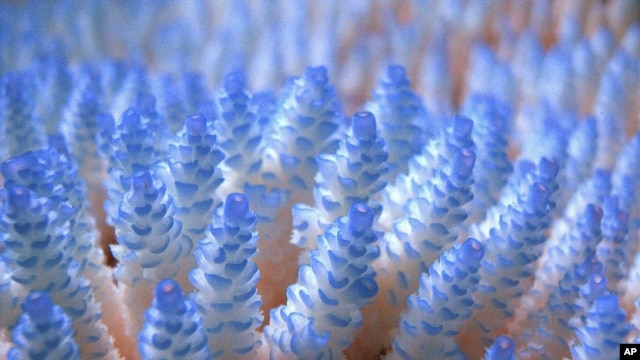Study Shows Positive Signs for Coral...
Reefs Resilient to Ocean Acidity Say Australian Researchers
December 14, 2012 New Australian research shows coral reefs are more resistant to ocean acidification than first thought. Scientists have been concerned that coral is vulnerable when carbon levels in the atmosphere rise, along with the acidity of the ocean. But an Australian National University study on the Great Barrier Reef suggests otherwise.
Reefs Resilient to Ocean Acidity Say Australian Researchers
December 14, 2012 New Australian research shows coral reefs are more resistant to ocean acidification than first thought. Scientists have been concerned that coral is vulnerable when carbon levels in the atmosphere rise, along with the acidity of the ocean. But an Australian National University study on the Great Barrier Reef suggests otherwise.
Amid the threat to reefs from the effects of climate change, pollution and overfishing, Australian researchers have found some rare good news. A team at the Australia National University in Canberra has been investigating coralline algae, which are plants that act like a glue to bind coral. One useful analogy is that the algae are the cement, while the coral are the bricks that comprise a reef system. A new study has found that dolomite, a carbonate mineral, helps to protect reefs from rising ocean acidity, which is caused by the absorption of carbon dioxide from the atmosphere.

Corals are seen at the Great Barrier Reef in this January 2002 handout photo.
Lead author Merinda Nash, a doctoral student, says it is an important discovery. There was a lot of concern that the coralline algae, which plays a key role in building the reef and binding corals together, that this would be the first thing to dissolve as CO2 went up and that that would impact the reef structure," she said. "So we found that this presence of dolomite actually reduced the dissolution rate significantly to about one tenth the rate of the algae without the dolomite, so that's quite good news. Many scientists believe that carbon emissions from the burning of fossil fuels are making the oceans more acidic.
Coral reefs are home to hundreds of fish, sea stars, crabs and marine worms, as well as a wondrous array of other animals and shellfish. Reefs across the Asia-Pacific are widely considered to be at risk from a variety of threats. Conservationists say Australias iconic Great Barrier Reef is at risk from industrial development, including dredging to build giant coal ports in the state of Queensland and from the run-off of pesticides from farms. By 2020 it is estimated that 7,000 ships will travel across the reef every year, as the export of Australias natural resources intensifies. The reef is the largest in the world and snakes for about 2,500 kilometers down Australias northeastern coast. It is the only living thing visible from space.
Source

